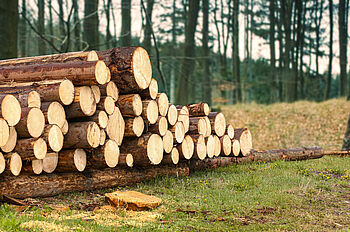Inhalt: Project details
Duration
09.2022 - 11.2025
Contact Person
Dr. Björn Hoppe (AG)
Tel: +49 (0)3946 47 7550
bjoern.hoppe@julius-kuehn.de
JKI Project team
Institute for National and
International Plant Health (AG)
Institute for Ecological
Chemistry, Plant Analysis and Stored Product Protection (ÖPV)
- Dr. Garnet Marlen Kroos
- Dr. Sibylle Kümmritz
- Yvonne Ratzlaff
- Verena Misgaiski
Institute for Forest
Protection (WS)
Institute for Epidemiology and Pathogen Diagnostics
- Christine-Maria Gottwald
The project "KLIMAtiv" is funded by the Federal Ministry of Food and Agriculture as part of the German Climate Protection Programme 2022.
KLIMAtiv is a collaboration project with the Johann Heinrich von Thünen Institute.
Inhalt: Climate-neutral fumigation processes and alternative treatment methods for the export of round timber (KLIMAtiv)
Background:
Sulfuryl fluoride (SO2F2/SF) is also used to treat barked logs for export to kill harmful organisms such as fresh wood insects, as well as fungi and nematodes to meet phytosanitary regulations of importing countries. As a substitute for the ozone-depleting methyl bromide, SF is used for limited, necessary applications as an insecticide and nematicide, but is itself a greenhouse gas with climate-damaging effects. Prolonged droughts in recent years and the associated mass proliferation of bark beetles have led to a massive emergence of calamity wood. China, in particular, is purchasing large quantities of softwood logs that are shipped in containers. China's import requirements allow the wood to be fumigated with SF, but with requirement profiles that differ significantly in both concentration-time product (CT product) and temperatures for the area of application approved in Germany. In addition, the export volume of logs also increases the use of the agent within the EU, associated with the climate-damaging effects.
Objectives:
Therefore, there is a need for action and research to i) generate efficacy data that allow for a proven and efficient application of the gas and to ii) evaluate alternative treatment methods (for example, alternative gases, non-chemical applications) through efficacy studies in the laboratory and in practice. The research project will make a significant contribution to the evaluation of the efficacy of approved as well as alternative and climate-neutral plant protection measures for log import and export. Likewise, the project will seek to develop risk mitigation measures that will include significant improvements to the methods used in export.


